RFS partners and stakeholders convene in Kenya for a final workshop
16 June 2023
Project Name
Upper Tana Nairobi Water Fund (UTNWF)
GEF Implementing Agency
IFAD
Objective
To achieve a well-conserved Tana River basin with improved water quality and adequate quantities for downstream users, and strong benefits to agricultural communities in the source watershed.
Project Targets
land under integrated and sustainable management
GHG emissions avoided or reduced
beneficiary households
Forests and wetlands in the Upper Tana River Basin project target area play an important role in maintaining water quality and quantity by storing and filtering runoff water. However, the growth of the agriculture sector in the area has resulted in an increase in soil erosion and sedimentation. This has reduced the capacity of reservoirs and increased the cost of water treatment. The challenges to water security will likely increase as climate change brings unpredictable rainfall, which threatens the resilience and food security of upstream smallholder farming systems.
The project is establishing a first-of-its-kind water fund in Africa. Through the project’s network of public agencies, NGOs, Community-Based Organisations, and private sector actors, the UTNWF is supporting smallholder farmers in rainwater harvesting, drip irrigation, and the adoption of climate-smart farming practices.
The project is structured around three principal components:
Support is being provided to 21,000 smallholder farmer households in the adoption of climate-smart practices, leading to improved food security, climate change adaptation and resilience capabilities.
The project aims to meet the following targets:
UTNWF Platform institutionalised for policy development and institutional reform.
Improved Upper Tana catchment ecosystems that support livelihoods, food security and economic development.
Robust knowledge management and learning systems implemented to direct UTNWF management and share lessons both nationally and regionally.
The UTNWF is a multi-stakeholder platform involving public and private sector entities. Key stakeholders from government include the Ministry of Environment and Natural Resources, National Museums of Kenya, Water Resources Management Authority, and Kenya Forest Services. The Nature Conservancy is a technical partner, while private sector entities include the Nairobi Water and Sewerage Company. The project is also closely engaging with county governments and research institutions, including Jomo Kenyatta University of Agriculture and Technology (JKUAT) and National Museums of Kenya (NMK).
Each RFS country project conducts activities that fall under common thematic areas within the programme. Explore each project theme relevant to the RFS Kenya country project below to see which activities are being implemented under each theme.
Stories from the Field
Explore our stories from the field to learn more about the activities, milestones, lessons learned, and achievements of the RFS Kenya project.
Relevant Resources
We have a growing library of reports, briefs, case studies, media, tools and guidelines. Explore all resources related to the RFS Kenya project to get greater insight into our programme activities.
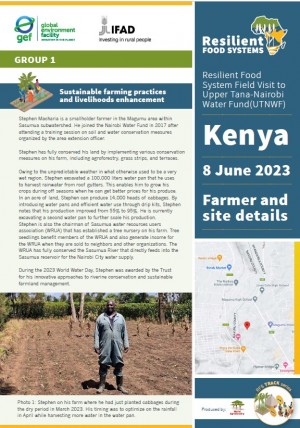
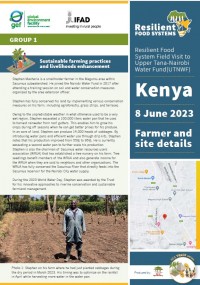
On 8 June 2023, participants of the Resilient Food Systems Programme Final Workshop visited field sites hosted by the Upper Tana-Nairobi Water Fund (RFS Kenya). This briefing note provides background on the farmers and sites visited.
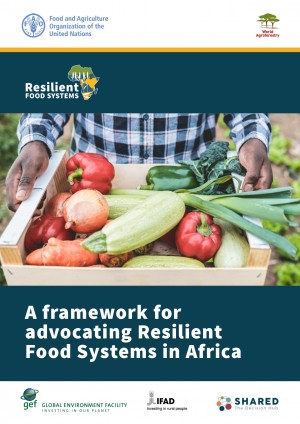
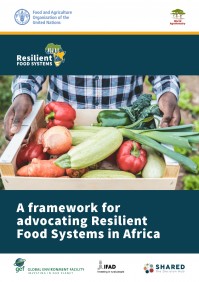
This framework aims to deepen the understanding of country teams to clarify their engagement in leveraging policy, institutional and behavioural change for achieving positive policy, institutional and human behavioural changes necessary to meet resilient food systems objectives. It provides an outline of the fundamental elements in the design and implementation of an advocacy strategy including understanding decision cycles and influence for sustainable land management and agroecological systems; shares experiences reflecting different scales of intervention (national, sub-national, local); and provides examples of how different mechanisms such as multi-stakeholder platforms can be used as an engine of socio-ecological change.
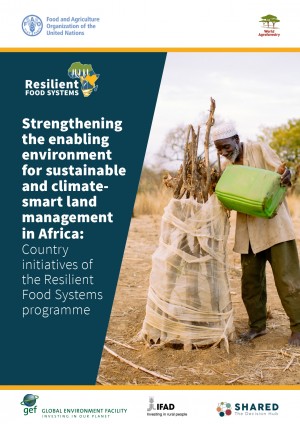
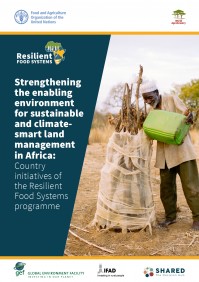
Barriers to implementation of sustainable land management (SLM) practices limit their ability to contribute to addressing land degradation. This report presents country case studies from the Resilient Food Systems programme highlighting SLM project activities undertaken in six countries in sub-Saharan Africa, and the lessons learned during their implementation. The innovative approaches to bridging governance and institutional gaps have demonstrated positive impacts on both the environment and livelihoods of rural communities.